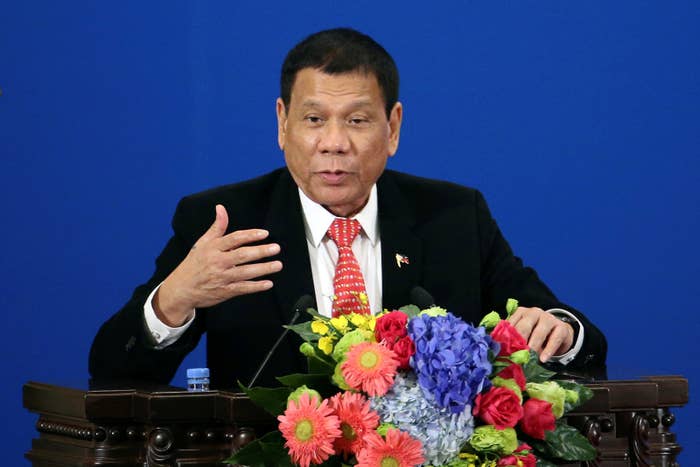
BANGKOK — Philippines President Rodrigo Duterte said he would "separate" from the US on Thursday during his trip to Beijing, his strongest signal yet that he could break with decades of US-friendly policies.
"I announce my separation from the United States," Duterte said to a wave of cheers and whoops from Chinese business and government officials at an investment forum in Beijing.
WATCH: #PresidentDuterte announces his separation from US in military and economic aspects. @rapplerdotcom
He also called Americans "loud" and "rowdy."
"Their larynxes are not adjusted to civility," he added, before doing his best impression of an American drawl.
WATCH: Duterte describes Americans, impersonates them accdg to his perception. @rapplerdotcom
With deep cultural similarities, close military ties, and a common interest in staving off Chinese naval assertiveness in the contentious South China Sea, Washington considers the Philippines a key ally in the region, though it was once a colonial power there.
But US ties with the Philippines, which is one of the few true democracies in Southeast Asia, have come under heavy strain over Duterte's bloody war on drugs, which has resulted in at least 2,000 suspected offenders being killed across the country since July, by both police officers and vigilante squads.
The Obama administration's criticism of the policy on human rights grounds led to Duterte calling Obama a "son of a whore" ahead of a regional summit in Laos last month. Obama scrapped a planned meeting with Duterte in response.
In contrast, China's Foreign Ministry has expressed approval of the anti-drug campaign this week.
"China appreciates President Duterte’s efforts to crack down on drug crimes and improve social security," ministry spokeswoman Hua Chunying said at a regular briefing on Wednesday, according to an official transcript. "We are ready to talk with the Philippine side about cooperation on drug control and fight against drug crimes."
US officials have been careful not to take major steps like cutting aid or military ties, to avoid damaging the longstanding relationship. The US uses access to naval bases in the Philippines to conduct military operations in the region, and sees the Philippines as key to curbing China's military expansionism in the South China Sea, where Beijing has built and expanded artificial islands and facilities with military applications in disputed waters.
It is also unclear what Duterte’s administration will mean for President Obama’s Asia pivot strategy, which has focused on bolstering military assets and building trade ties in the Asia Pacific. Chinese officials have said they believe the US is seeking to “contain” China — a charge the Obama administration has denied.
Duterte said Wednesday that there would be "no more American interference, no more American exercises."
Hundreds of anti-American protesters gathered outside the US embassy in Manila this week in support of Duterte's foreign policy.
Duterte and Chinese president Xi Jinping also agreed to talks on the South China Sea issue, where the two countries dispute control over islands, reefs, and their surrounding waters. Though the US is technically neutral in the territorial dispute, the administration has repeatedly criticized China for its construction in disputed waters and for harassing fishers from the Philippines.
